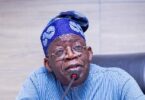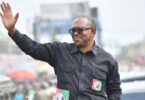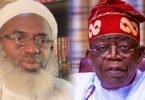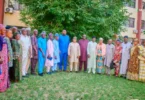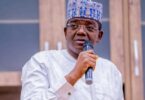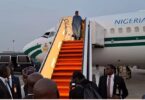President Bola Tinubu may have capitulated to political intrigues in the Presidency as well as other vested interests and called off his earlier resolve to sanitise leading government-owned enterprises (GOEs), which led to the inauguration of Jim Obazee panel, The Guardian learnt at the weekend.... CLICK TO READ THE FULL NEWS HERE▶▶
The abrupt closure of what was meant to be an extended and far-reaching fact-finding mission of the Special Investigator and his team, the investigation suggested, was the nail in the coffin.
The letter conveying the appointment of Jim Obazee was personally signed by the President, showing the weight of the assignment. Obazee, who was merely the public face of a carefully selected team of forensic auditors charged with the responsibility of cleaning up the Central Bank of Nigeria (CBN) and “related entities”, was to report to the President directly.
The Guardian reported that the team, independently drawn by Obazee from the six geopolitical zones, had direct and uncensored access to the President at the start of the assignment.

But the privilege was contained as politicians began to get in the way of the team. The Guardian also reported that top business executives and politicians being indicted by the activities of the investigators were throwing spanners into the investigation with outright blackmail becoming a major weapon.
Sources privy to the events that led to what is now seen as a premature closure of the assignment confided that the press statement announcing the closure came before “a serious examination of the extent of collaboration between those who mismanaged the CBN and managers of related entities”.
In a letter dated July 28, 2023, the President said Obazee would work on a comprehensive report on public wealth being pocketed by a tiny percentage of Nigerians and report directly “to my office”.
“By the fundamental objective outlined in Section 15(5) of the Constitution of the Federal Republic of Nigeria 1999 (as amended), this administration is, today, continuing the fight against corruption by appointing you as a Special Investigator, to investigate the CBN and related entities…
“The full terms of your engagement as Special Investigator shall be communicated to you in due course but, require that you immediately take steps to ensure the strengthening and probity of key Government Business Entities (GBEs), further block leakages in CBN and related GBEs and provide a comprehensive report on public wealth currently in the hands of corrupt individuals and establishments (whether private or public).
“You are to investigate the CBN and related entities using a suitably experienced, competent and capable team and work with relevant security and anti-corruption agencies to deliver on this assignment. I shall expect a weekly briefing on the progress being made,” the appointment letter read.
The investigator, on the back of the directive by the President who promised non-interference in the process, was said to have proceeded to select individuals with track records of commitment to probity and accountability across different parts of the country. All the geopolitical zones, according to reliable information, had at least one representative.
But till the April press statement announcing the closure of the team, members from core northern zones had not joined the team on the excuse that compensation terms had not been concluded while their colleagues from the south and north central, which had two representatives, including the information technology expert, worked 24 hours to crack the corruption endemics in the CBN and relative entities.
Some of the absentee members were said to have demanded accommodation, vehicles and sundry ‘work tools’ as conditions without which they would not spare their time for the national assignment.
The conditions of service, according to findings, were never communicated with the team but there was an unwritten understanding between the team and the Presidency that they would be paid from the recoveries. But details as to specific figures and other things were not communicated.
Over three months after the termination of the activities, The Guardian learnt that nothing has been mentioned about the allowances or compensation with some members, who cannot the President, keeping their figures crossed.
A closure press statement signed by Presidential spokesman Ajuri Ngelale read: “After the conclusion of the assignment and the submission of a final comprehensive report and with the winding up of all apparatuses used during the scope of the task which terminated on March 31, 2024, the investigation is formally closed, with all appropriate law enforcement and regulatory agencies already conducting follow-up action.”
However, those knowledgeable about the works of the committee said the statement showed the level of deviation from the original plan while the same regulatory agencies the President did not have any confidence in when the panel would set up would honestly conduct “follow-up actions”.
Contrary to the content of the statement, The Guardian also learnt that the committee had not submitted a final report.Indeed, the media have been awash with different revelations said to have been gleaned from the final report, with the majority focusing on the stewardship of the former CBN governor, Godwin Emefiele.
At the weekend, an insider source wondered how the final report of a panel of “that status” could have been submitted without public knowledge. Another source said what had been feasted on by the media were progress reports from the panel or distorted facts being bandied by individuals with agendas different from the objective of the Special Investigator.
The CBN reportedly sacked some directors of the apex bank in line with the recommendations of the committee. However, multiple sources described such actions as misjudgment, saying a fact-finding report could not have been taken as a statement of finality and acted on as a judicial pronouncement.
“Prosecution is more important than whatever findings come from the panel. If the report of the investigators was used for sack, that is certainly out of procedure. The report, even if it were final, should provide the basis for prosecution. At best, it is not an indictment that should be tested at the court,” a source argued.
In scope and otherwise, the panel had achieved less than 10 per cent of its mandate before the premature closure. So far, only the Central Bank with its managers has been mentioned about the works of the panel, which was also beaming the searchlight on the NNPC Limited, Nigeria Inter-Bank Settlement Systems Plc, The Nigerian Security Printing and Minting Plc and many other entities, including deposit money banks (DMBs).
Mid-way into the exercise, the panel also became the subject of an integrity test, with the leader said to have been petitioned by different individuals and officials who claimed that he had taken bribes.
The weightiest report, according to information available to The Guardian was the one from the Office of the National Security Adviser (NSA). Besides, there were torrents of indictments believed to have been targeted at blackmailing the team.
At the Financial Reporting Council of Nigeria (FRC), where he was a pioneer chief executive, Obazee earned the reputation of an incontrovertible examiner who put banks and even their regulator on their toes. His indictment of the Central Bank under Sanusi Lamido Sanusi led to the suspension of the emir as CBN governor.
Tinubu may have missed the opportunity to fully sanitise the CBN and the entire financial system with the ill-time disbandment of the panel. Ex-President Muhammadu Buhari, it was learnt, made several efforts to set up the ad hoc committee. The last-ditch attempt, it was learnt, was botched by the Secretary to the Federal Government, Boss Mustapha, who was assigned to issue an appointment letter to the effect.
Mustapha was said to have said that the proposal would “not fly” because of the complexity of the issues it was meant to address. Subsequently, the team that sold the idea to Buhari was directed to provide technical support to the Department of State Service (DSS), which ended up narrowing the broad issues to terrorizing financing indictment against Emefiele.
With only Emefiele being seriously prosecuted out of 159 individuals said to have been indicted by the interim report of the panel, the process may have been hijacked by politicians and politically exposed persons. Whereas the CBN has gone ahead to relieve the indicted directors, who are now seeking redress from the National Industrial Court of Nigeria, many of those also accused of some wrongdoings during Emefiele’s nine years in office have been shielded from the law.
Some stakeholders who have long called for an in-depth and independent investigation into the alleged historical mismanagement of the monetary authority are said to be routing for the reconstitution of the Obazee panel, even if the membership would need to be changed, and possibly expanding the scope.



